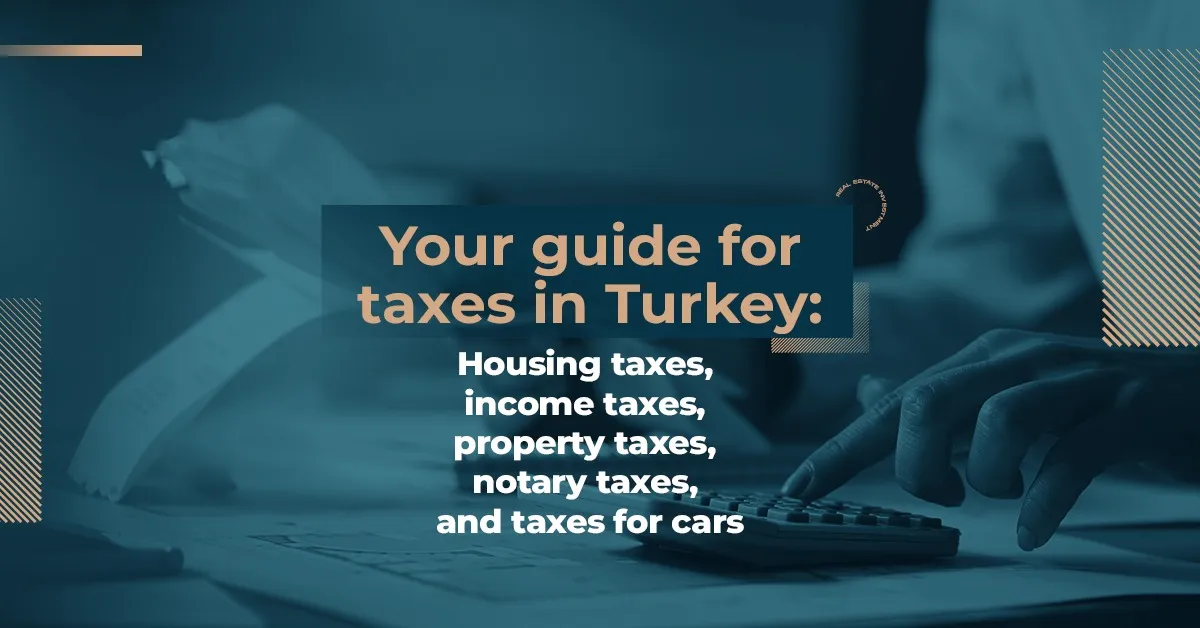
Your guide for taxes in Turkey: Housing taxes, income taxes, property taxes, notary taxes, and taxes for cars
Table of Contents
Taxes are an essential part of any country's financial system, and Turkey is no exception. If you intend to live or invest in Turkey, it is essential to understand the tax system here. In this article, we will provide you with a comprehensive guide to taxes in Turkey, including taxes on housing, income, property, notary public, and cars.
Main types of taxes in Turkey:
Income tax in Turkey:
- Personal income tax: It is imposed on the annual income of individuals. Tax rates for individuals’ range between 15% and 35%, and their rates vary according to the level of income.
- Corporate income tax: It is imposed on corporate profits, and the income tax is 22%. The income tax is calculated based on the annual gross income.
Who is subject to income tax in Turkey?
- Permanently residing in Turkey.
- Resident in Turkey for six months or more without interruption during the calendar year.
- Turks residing outside Turkey as a result of the activities and work of companies and institutions based in Turkey.
- Income tax is deducted from all profits and imports obtained by these individuals inside and outside Turkey.
Income tax law in Turkey
The annual income tax is declared in the period extending from the beginning of March until the evening of the 25th of the same month each year and is paid in the form of two installments. The first installment is paid in the period extending until the end of March, while the second installment is paid in the period extending until the end of In the month of July, the tax is paid to the tax department located within the areas of residence of the individuals charged with paying the tax, or within the areas to which the place of work of those charged with paying the tax is linked, or through banks.
Real estate taxes in Turkey:
What are the real estate taxes in Turkey?
Real estate taxes in Turkey are amounts of money paid by both the buyer and seller to the Tax Department when purchasing a property in Turkey, or when transferring ownership of a property from the seller to the buyer, and the same value of taxes is paid to Turks and foreigners alike.
What are the types of real estate taxes in Turkey?
- Value Added Tax (KDV):
It is a tax imposed by the Turkish government on all goods and services, and its rate is 18% for commercial real estate, and the rate ranges between 1% - 8% - 18% for residential real estate. The value of the value added tax is determined according to the net area of the property and not its total area. For example, if the net area of the residential property is more than 150 square meters, the value of the added tax is 18% of the price of this property, but if the net area of the residential property is less than 150 square meters, the value of the added tax ranges from 1% up to 18%, as the type of property, its area, the level of construction, and the price per square meter all play a role in determining the value of the tax. The value added tax is paid only once when purchasing the property.
- Title deed tax:
The value of this tax is 4% of the total value of the price of a property as recorded in the sales contract, and it is paid upon registering the title deed at the Land Registry Department in Turkey. The value of the title deed tax is usually paid equally between the seller and the buyer when transferring ownership, that is, when buying or selling, with each party paying only 2% of the value of the tax.
- Municipal tax on real estate in Turkey:
Turkish municipalities impose an annual fee of 0.03% of the property value on properties located within the area served by the municipality, and this tax is paid for the services provided by the municipality.
- Earthquake tax:
It is an annual tax paid by the property owner in Turkey to insure his home against natural disasters and earthquakes, and its value is $2 per square meter of the property’s area.
Exemption from real estate tax
The tax exemption decision when purchasing real estate in Turkey was issued in February 2017. This decision stipulates that non-resident foreigners in Turkey and Turks residing outside Turkey for a period of 6 months or more are exempt from value added tax.
What are the conditions for tax exemption when buying a property in Turkey?
- The property buyer must be a foreigner who does not reside in Turkey, or a Turk residing outside Turkey.
- The property must be new
- Not selling the property for one year from the date of purchase.
- The property must be purchased in a foreign currency, dollar or euro.
- Transferring the property purchase amount from a bank outside Turkey to a Turkish bank or entering it through a Turkish airport.
Value Added Tax in Turkey (KDV):
It is a tax on consumption, imposed on products and services in the stages of production and distribution, by adding a small percentage determined by the state according to the type of commodity to the final price of the product, to be collected from the final consumers and transferred to the tax authorities.
What is the value-added tax rate in Turkey?
According to the official amendments issued on 7/7/2023 to the value-added tax law in Turkey (KDV), the Turkish government decided to increase the tax rate on some specific categories, and accordingly, the tax rate became as follows:
- Basic goods, such as: bread and basic grains. This category of goods was not affected by the increase, and the value-added tax rate on it is 1%.
- Other basic goods, such as tissues, detergents, books, magazines, etc.: 10%.
- A wide range of professional services and luxury goods, such as: furniture, electrical appliances, electronic products, cars: 20%.
Property taxes in Turkey:
-
Property tax (Emlak Vergisi):
It is imposed on all types of real estate, including houses, apartments and commercial land, and is calculated based on the value of the property assessed by the tax administration, and is paid annually in March.
-
Land tax (Arazi Vergisi):
It is imposed on all types of land, including agricultural land and vacant lands. It is calculated based on the area of the land and its value estimated by the tax administration and is paid annually in March.
Car taxes in Turkey:
Owners of vehicles of all types in all Turkish territories are required to pay different fees upon purchase and inspection, and the tax is calculated for vehicles according to their type, date of manufacture, price, specifications, engine specifications and use.
1- Car consumption tax in Turkey ÖTV Matrah
Car owners in Türkiye pay what is known as the Motorlu Taşıtlar Vergisi tax (MTV). According to traffic laws in Turkey, cars in Turkey are required to pay two annual consumption taxes, the first in January and the second in July of each year.
2- Inheritance and car import taxes in Turkey
Regarding car taxes in Turkey, with regard to inheriting, selling, or donating a car, the registration tax ranges from 1 to 30% of the vehicle’s value.
On the other hand, Turkey is one of the countries that imposes the highest taxes on imports, including the import of cars, which amount to about 80% of the car’s value.
If cars are imported from outside Turkey for commercial purposes, companies and showrooms must pay customs taxes amounting to about 180%.
3- Vehicle inspection tax or car inspection in Turkey
The value of this tax is updated periodically by TÜVTÜRK
Finally, Turkey's tax laws require careful attention and understanding to avoid legal problems and ensure compliance with local laws and regulations. It is important to check local tax updates regularly and hire a tax expert if necessary. If you are considering investing or living in Turkey, professional tax advice may be necessary to keep your money safe.
- Note: This article provides general information about taxes in Turkey, and details may vary depending on your personal situation and local legislation. For accurate information, you are advised to speak with a qualified accountant or local tax advisor. We at Luxury Signature have a specialized legal team to assist you in all transactions in Turkey.
Useful links:
Turkish General Tax Directorate: https://gib.gov.tr/en
Turkish Ministry of Finance: https://en.hmb.gov.tr/
Turkish Tax Association: https://www.gib.gov.tr/en
Frequently asked questions
Personal income tax: It is imposed on the annual income of individuals. Tax rates for individuals range between 15% and 35%, and their rates vary according to the level of income.
Corporate income tax: It is imposed on corporate profits, and the income tax is 22%. The income tax is calculated based on the annual gross income.
The annual income tax is declared in the period extending from the beginning of March until the evening of the 25th of the same month each year, and is paid in the form of two installments. The first installment is paid in the period extending until the end of March, while the second installment is paid in the period extending until the end of In the month of July, the tax is paid to the tax department located within the areas of residence of the individuals charged with paying the tax, or within the areas to which the place of work of those charged with paying the tax is linked, or through banks.
The value of this tax is 4% of the total value of the price of a property as recorded in the sales contract, and it is paid upon registering the title deed at the Land Registry Department in Turkey. The value of the title deed tax is usually paid equally between the seller and the buyer when transferring ownership, that is, when buying or selling, with each party paying only 2% of the value of the tax.
The taxes associated with purchasing property in Turkey include the title deed fee, which is 4% of the property's value, and service and utility fees such as electricity and water.
Yes, foreigners can obtain bank loans to purchase property in Turkey. Loans are provided based on the terms and guarantees specified by the bank.
The property transfer process usually takes from three days to two weeks, depending on the speed of completing the procedures and the availability of the necessary documents.








